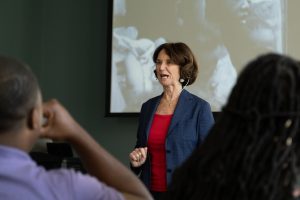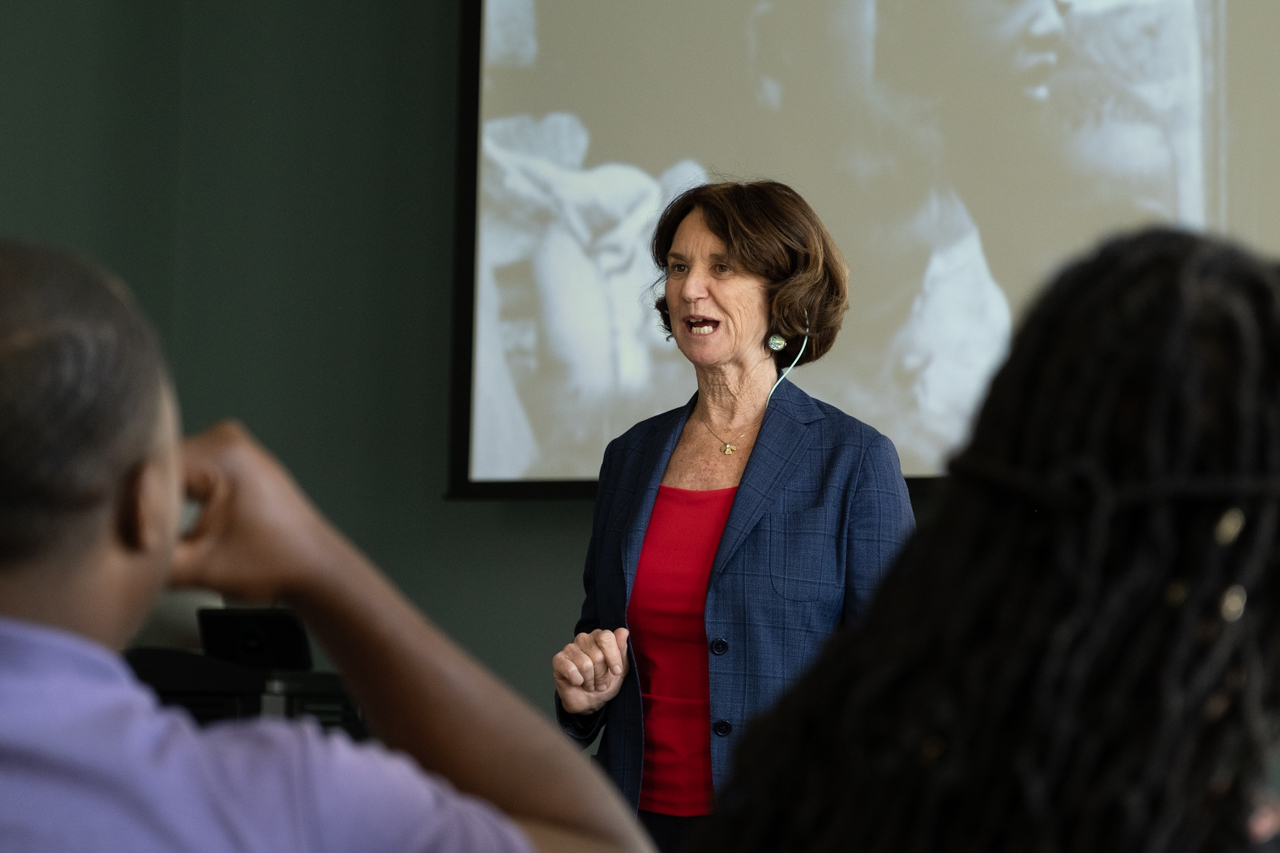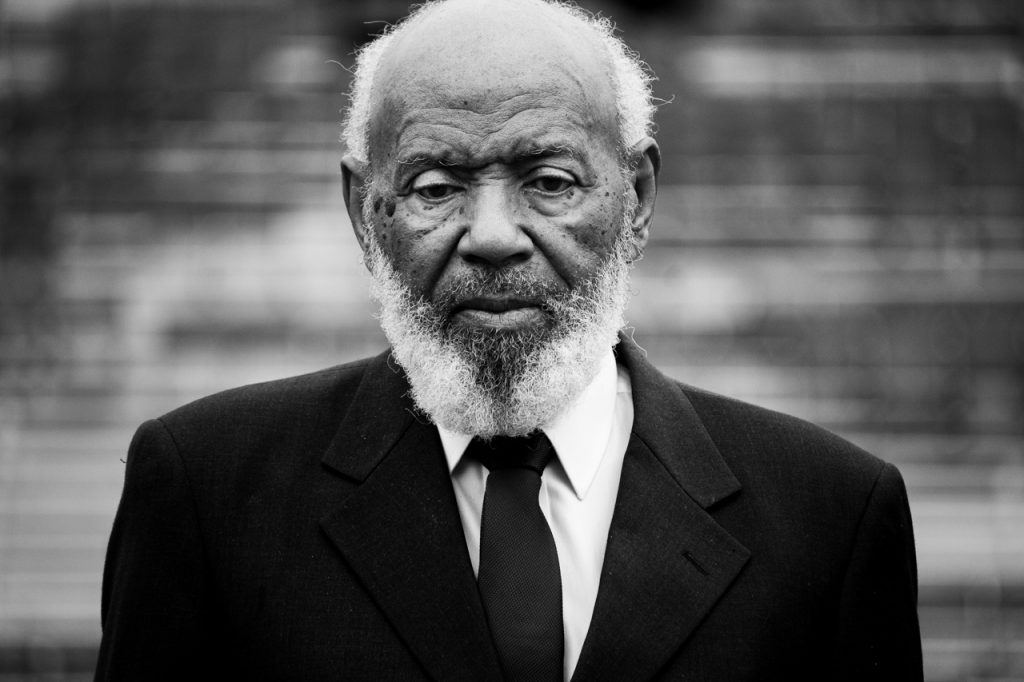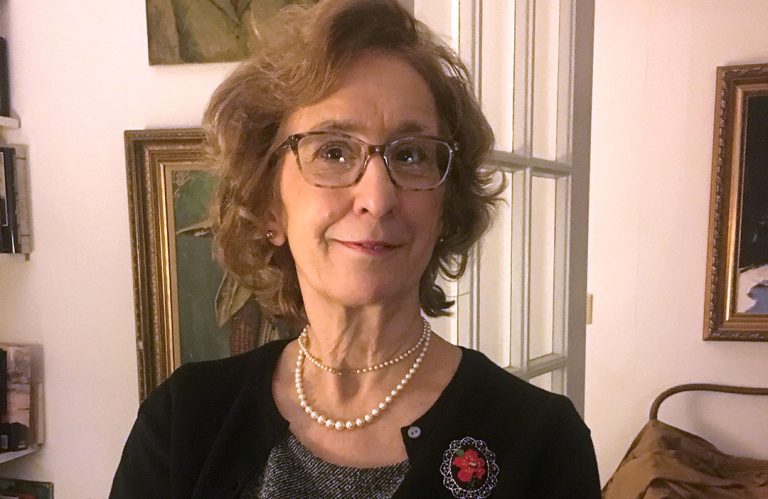
Kathleen Kennedy Townsend, former Lt. Gov. of Maryland and daughter of Robert Kennedy, spoke at a documentary screening detailing her father’s involvement with Mississippi called “You Asked For The Facts,” at the University of Mississippi Law Center on Monday, Sept. 26.
In 1967, then Sen. Robert Kennedy visited the Mississippi Delta, and he was struck by the extreme poverty and starvation that he encountered.
“When my father came back from his visit to the Delta, he came into our dining room, and he was really shaken, in a way he had never been before he had been to the Delta. People were really poor, and they were starving,” Kennedy Townsend said.
Her voice softened, and she began to hang on to each word she spoke, ensuring that the audience hung on to her words with the same reverence with which she delivered them.
“And he came in and he said, ‘We have a beautiful dining room: crystal chandelier, beautiful linen, lovely dishes.’ And he said, ‘You know I’ve just been to homes where a whole family lives in a room as large as our dining room. And they’re starving, with distended stomachs with sores all over them. Do you know how lucky you are? Do you know how lucky you are? We have to do something for our country. We really do. Take some responsibility,’” she recalled.
As she finished reciting the words of her father, the audience erupted into applause.
“He said that quite often. In our family, there was a very strong sense of responsibility, which comes from being Catholic and a member of my family,” she said.
The audience had just finished watching a screening of the documentary “You Asked For the Facts: Robert Kennedy at the University of Mississippi,” with director Mary Blessey, an alumna of the university, in attendance.
The film detailed Kennedy’s work as attorney general in 1962 to integrate the university and negotiate with then-Mississippi Gov. Ross Barnett, a segregationist who wanted to appease his enraged white base while also creating a comfortable way for himself to cede power to the federal government without losing face. On private phone calls to President John F. Kennedy and Robert Kennedy, Barnett pleaded for the president to send 40 national guardsmen to the university to counter the riots. He even asked for those guardsmen to point their guns at him, to give the impression to his white voters that he surrendered the university only at gunpoint.
In the spring following the riots, Barnett would finish his term as governor. As Mississippi law at the time prevented him from running for a consecutive term in 1963, he would plan to run again for governor in 1967.
Many were worried about what Barnett would do if he won a second term, and he seemed a tough candidate to beat. A group of Ole Miss Law students that wanted to keep Barnett from being re-elected hatched a plan and formed a student group, the Speaker’s Bureau, which organized an event where several conservative speakers, as well as Robert Kennedy, would address a crowd at the University of Mississippi.
The students asked Kennedy to speak about what Barnett did during the riots, but he refused to speak ill of the governor. Rather, Kennedy agreed to speak at the university, and of Barnett’s actions during the riot, but only under the condition that he would be pressured into divulging the information in front of the crowd during a questioning period. Kennedy did not want it to look like he was eager to speak ill of Barnett.
Kennedy’s inclusion on the list was met with much public outcry, and the event was nearly canceled altogether. Nevertheless, the event was held and Robert Kennedy and his wife, Ethel, visited the university on March 18, 1966. The Kennedys, much to their own surprise, were welcomed with the thunderous applause and warm cheers of 6,000 students and faculty.
“Who do you believe to be responsible for the Ole Miss riots, and why?” a student asked.
The Speakers Bureau had made sure that this event would play out as planned. The student moderator who fielded questions for Robert Kennedy was working in conjunction with the Speakers Bureau, and he swiftly picked out the audience member from the crowd that had the important prepared question ready.
“That’s an interesting question,” Robert Kennedy said with an exasperated smile, and the audience laughed nervously along with him.
He went on to explain Barnett’s duplicitous behavior during the riots, and the audience laughed uproariously when they heard how the former governor had handled the riots. He had been exposed, and when it came time for election day, Barnett finished in a dismal fourth place. Kennedy’s successful speech was huge news for Mississippians.
“None of them could believe that Robert Kennedy was clapped for and could make people laugh. It sent a ripple through the university, about how a person that they hated and jeered and couldn’t believe had caused so much violence was a different human being when you got to meet him,” Kennedy Townsend said. “Laughter is a way to break down barriers. It is one of the best ways to get people to understand each other, and it’s hard to do because with laughter you have to understand the person and understand what they like.”
In addition to speaking to the audience at the screening, Kennedy Townsend talked with students, faculty and the descendants of Mississippians from the Delta whom her father had met during a visit in 1967.
On Tuesday, Sept. 27, Kennedy Townsend gave a speech at the Mississippi Civil Rights Museum in Jackson. Accompanied by Hiram Eastland, a lawyer and the nephew of the prominent segregationist Mississippi Sen. James Eastland, Kennedy Townsend will soon visit the rural Delta towns that her father had seen such extreme poverty in 55 years ago.
“I assume I will not see the depth of poverty that my father saw, because the food stamp program has changed, and I think that’s been very helpful. The policy released after COVID has also provided people with a lot more money, and I don’t know if that will last, but I suspect that things have changed for the better over the past few years,” she said.
Kennedy Townsend is now working to find solutions to provide affordable retirement plans in the United States, as half of older Americans have no money saved for retirement. She regards the issue as systemic, not individual, and hopes to assuage the fears of elderly people who are more afraid of retirement than their own death.
Thinking of the greatest lesson to be taken from the work her father did in Mississippi, Kennedy Townsend said, “Keep talking to people. Don’t be afraid of talking to people with whom you disagree. That’s number one. Just because we disagree on issues doesn’t mean that I don’t love the person.”
















